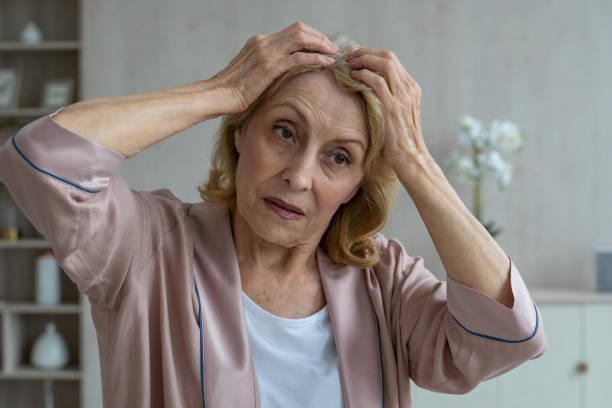As individuals undergo the natural process of aging, they experience various physiological transformations, among which hair loss stands out as a prominent concern. Senior baldness, recognized as age-related hair loss, is frequently observed among older demographics and tends to be associated with a multitude of erroneous beliefs and misunderstandings. This article from Annapolis Home Care aims to demystify senior baldness, clarifying its genuine causes and effective management methods for older adults.
Myth 1: Hair Loss is Inevitable with Age
One of the most pervasive myths surrounding senior baldness is the belief that hair loss is an inevitable consequence of aging. While it is true that many individuals experience some degree of hair thinning as they get older, not everyone will go bald. Moreover, age-related hair loss is not solely determined by chronological age but is influenced by a combination of genetic predisposition, hormonal changes, and lifestyle factors.
Genetics strongly influence hair loss susceptibility, with specific genes linked to male and female pattern baldness. Hormonal shifts, like testosterone and estrogen fluctuations, and factors like stress, inadequate nutrition, and certain health conditions can worsen hair thinning and balding in older individuals.
Myth 2: Only Men Experience Hair Loss
While it is true that male pattern baldness, characterized by a receding hairline and thinning crown, is more commonly associated with men, women can also experience hair loss as they age. Female pattern baldness may present differently, often manifesting as overall thinning of the hair rather than distinct bald patches. Hormonal changes during menopause can contribute to hair loss in women, making it important to recognize that both genders are susceptible to age-related hair thinning and baldness.
Myth 3: Wearing Hats Causes Hair Loss
Contrary to popular belief, wearing hats does not directly cause hair loss. While it is true that excessively tight hats or headgear worn for prolonged periods can potentially contribute to hair breakage or traction alopecia, the act of wearing a hat itself does not lead to permanent hair loss. In fact, hats can provide protection from the sun’s harmful UV rays, which can help preserve the health of the scalp and hair follicles.
Myth 4: Hair Loss is Irreversible
Another common misconception is that once hair loss begins, there is no effective way to reverse it. While it is true that some forms of hair loss, such as male and female pattern baldness, are progressive and may not be fully reversible, there are various treatment options available to slow down the progression of hair loss and stimulate new hair growth.
For example, medications such as minoxidil (Rogaine) and finasteride (Propecia) have been shown to be effective in slowing down hair loss and promoting hair regrowth in some individuals. Additionally, advanced hair restoration techniques such as follicular unit transplantation (FUT) and follicular unit extraction (FUE) can help restore a fuller head of hair for those experiencing more significant baldness.
Click Here: Quality Senior Care Challenges & Solutions At Home
Myth 5: Natural Remedies Alone Can Reverse Hair Loss
While there is no shortage of purported natural remedies for hair loss, such as herbal supplements, essential oils, and scalp massages, it is important to approach these treatments with caution. While some natural remedies may provide temporary relief or improve the overall health of the hair and scalp, they are unlikely to reverse significant hair loss on their own.
Age-related hair loss requires a holistic strategy encompassing medical treatments, lifestyle changes, and good hair care practices. This involves a balanced diet, stress management, gentle hair treatments, and consulting healthcare professionals for guidance.
Conclusion:
Senior baldness is a common concern among older adults, yet it is often accompanied by myths and misconceptions that can perpetuate unnecessary worry and frustration. By debunking these myths and shedding light on the true causes and effective management strategies for age-related hair loss, older adults can make informed decisions about their hair health and embrace aging with confidence.
Respite Care Annapolis staff helps address the challenges of senior baldness by providing personalized support and assistance tailored to the individual’s needs. Caregivers can help seniors maintain proper scalp hygiene, administer prescribed medications, and monitor any changes in hair health. Additionally, they offer emotional support, helping seniors cope with the psychological impact of hair loss and maintain a positive self-image throughout the aging process. With advances in medical treatments and a holistic approach to hair care, it is possible to maintain a healthy head of hair well into the golden years.




